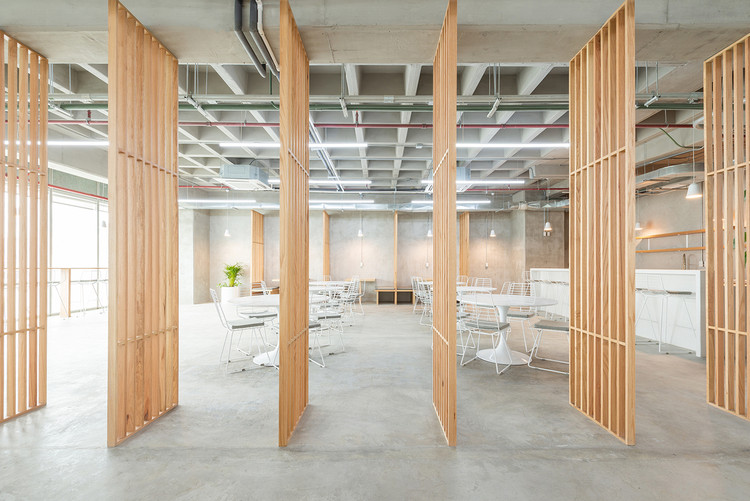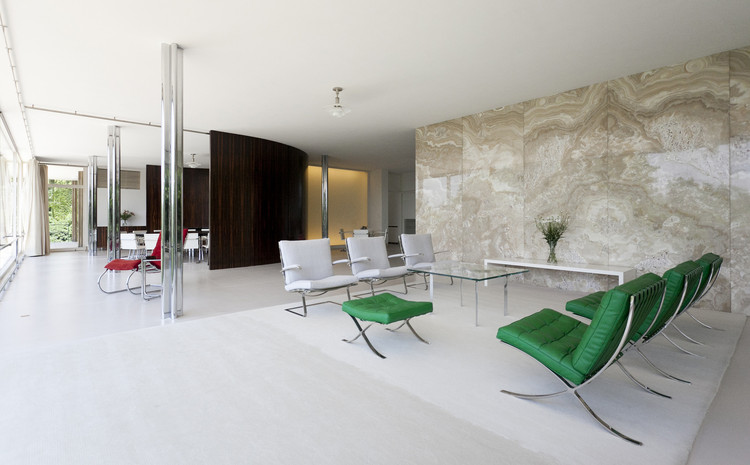Archte Tect Design House Plans
Open Plan: The Latest Architecture and News
What Makes Mies van der Rohe's Open Plans

Ever wondered (or forgotten) the difference between open plans and free plans? In this video, architectural designer and professor Stewart Hicks breaks down what makes Open Plans a unique form of 'open concept.' It is part of a series that explores terms from real estate using contemporary, historical, and theoretical examples from architecture. In this case, the spatial strategies of Mies van der Rohe are explained, beginning with his early unbuilt houses, through the Barcelona Pavilion, to the Farnsworth House. Each one features a particular, but evolving, use of walls, columns, and roof planes that add up to what we call 'Open Plans.' Other videos in the series are dedicated to things like Free or Organic Plans and can help anyone sharpen their understanding of architectural concepts.
https://www.archdaily.com/955966/what-makes-mies-van-der-rohes-open-plans Diego Hernández
The 5 Points of Modern Architecture in Contemporary Projects

In 1926, Le Corbusier developed the five points that would become the foundations for modern architecture. Once materialized in 1929 in the iconic Villa Savoye project, Le Corbusier's principles - pilotis, free design of the ground plan, free design of the facade, horizontal window, and roof garden - have been extensively explored in modern architecture and continue to influence the most diverse contemporary architectural projects to this day.
The five points became a kind of guideline for the New Architecture, as Corbusier used to call it. Even after decades, new technologies, materials, and demands of society have continued to update those architectural solutions, announced almost a century ago as the basis for a new architecture.
.jpg?1600176766)
.jpg?1600178326)


 + 41
+ 41
https://www.archdaily.com/948273/the-5-points-of-modern-architecture-in-contemporary-projects Susanna Moreira
16 Projects that Push the Free Plan to its Limits

Modern architecture, visible in contemporary production, is usually related to the use of guidelines established by Le Corbusier's five points of architecture. Despite being widely known and debated for years, these points continue to be revisited and rethought in projects from various places and contribute to the creation of interesting buildings in various programs.
https://www.archdaily.com/922503/16-projects-that-push-the-free-plan-to-its-limits Julia Daudén
AD Classics: Amsterdam Orphanage / Aldo van Eyck





 + 14
+ 14
Dutch Architect Aldo van Eyck built the Amsterdam Orphanage in 1960. His design focused on a balance of forces to create both a home and small city on the outskirts of Amsterdam.
https://www.archdaily.com/151566/ad-classics-amsterdam-orphanage-aldo-van-eyck Igor Fracalossi
Hybrid Homes: Living and Working Collide in These 26 Projects





 + 27
+ 27
Normally, houses are divided into common areas, rooms, kitchens, and bathrooms. However, sometimes the client demands to add other programs related to their work or hobbies, making efficient design and daily spatial distribution more complex. As architects, we are faced with an interesting challenge: to merge the private life of its inhabitants with more public and open programs, generating exciting mixed-use spaces.
If you are interested in designing hybrid homes, we have selected 26 houses with additions including shops, soccer fields, barns, greenhouses, and even skateparks.
https://www.archdaily.com/898641/hybrid-homes-living-and-working-collide-in-these-26-projects María Francisca González
Learn About Open Floor Plans Via These 6 Iconic Residences

Le Corbusier's "Five Points of Architecture" functioned in the twentieth century as the go-to guide for architectural production; it is also a significant work in understanding the legacy of modern architecture. Horizontal windows, free design of the facade, pilotis, roof gardens, and perhaps the most significant point, free design of the ground plan form the Franco-Swiss architect's manifesto. In terms of design practice, this last point means distinguishing structure and wrapper, which allows the free disposal of dividing walls that no longer fulfill a structural function.
Residential projects were once characterized by a clear division of environments linked to domestic dynamics, now filtered by modern discourse, the house became flexible and capable of new spatial articulations.
To better understand the modern domestic space, we gathered some of the most emblematic examples of residences and their floor plans.
https://www.archdaily.com/897525/learn-about-open-floor-plans-via-these-6-iconic-residences Julia Daudén
Mecanoo Reveals Images (And a LEGO Model) of Competition-Winning Social Housing Proposal in Taiwan

Mecanoo has released images of their competition-winning social housing proposal for the city of Kaohsiung, Taiwan. The 234-unit-scheme embodies Mecanoo's philosophy towards social housing, "defined by flexibility, the right balance of private and communal spaces, mixing housing types, connection with the environment and identity." Comprised of two buildings linked by a green canopy, the scheme is designed for a variety of users, including students, young families, the elderly, or people with special needs.




 + 13
+ 13
https://www.archdaily.com/893642/mecanoo-reveals-images-and-a-lego-model-of-competition-winning-social-housing-proposal-in-taiwan Niall Patrick Walsh
Street Canvas II / TA architect
https://www.archdaily.com/886007/street-canvas-ii-ta-architect 舒岳康
Why Open-Plan Offices Don't Work (And Some Alternatives That Do)

This article was originally published by Amar Singh on Medium titled "You're working in the wrong place."
At my most recent job, I did all of my best work at home. I would actively try to avoid the office for as long as possible. At home, I had two desks and complete control over my environment. Distractions and breaks were choices.
Once I went into the office, the environment changed. There were constant distractions, from other employees, dogs barking (for the record: puppers were a net positive), impromptu meetings and birthday celebrations. It was very difficult to get into flow states and incredibly easy to be broken from them. Of all the places I could work, my desk at the office was often the worst option.
https://www.archdaily.com/884192/why-open-plan-offices-dont-work-and-some-alternatives-that-do Amar Singh
UNStudio Designs Dubai Supertall with One of the World's Tallest Ceramic Facades

UNStudio, working in collaboration with Werner Sobek, have unveiled their designs for the Wasl Tower, a 300-meter tall skyscraper in Dubai. Centrally located along the main thoroughfare that connects the Emirates north to south, the Wasl Tower sits directly opposite the Burj Khalifa and, once completed, will feature one of the world's tallest ceramic facades. Inspired by the movement of the city, the 300-meter supertall building takes on a "contrapposto" form, responding to the Sheikh Zayed Road along which it is sited.
https://www.archdaily.com/882608/unstudio-designs-dubai-supertall-with-one-of-the-worlds-tallest-ceramic-facades Samantha Buckley
From Cubicles to Hot-Desks, Here Are the Origins of the Open-Plan Office
Some love them, some loath them: open-plan office spaces are either conducive to conversation and collaboration or nothing more than noisy environments defined by distractions. Much, for instance, has been questioned recently about the "innovative" open working environments in Apple's new Cupertino campus. In a new series by Vox, overlooked, misrepresented, and overrated phenomena are put under the microscope. By exploring the work of Frank Lloyd Wright, Herman Miller, and others, this episode posits that open office spaces are, contrary to popular assumption, "misunderstood for their role in workplace culture."
Where did open offices and cubicles come from, and are they really what we want?
https://www.archdaily.com/881479/understanding-the-origins-of-the-open-plan-office-space AD Editorial Team
MVRDV Breaks Ground on Riverfront Housing Complex in Bordeaux

MVRDV and local architects Flint have revealed designs for a new riverfront mixed-use housing complex in Bordeaux, Ilot Queyries, as the project breaks ground. Located on the east bank of Garonne River, the site will house over 300 apartments, retail spaces, a rooftop restaurant, and a communal park in a densely mixed environment. The complex will integrate into the neighboring ZAC Bastide-Niel masterplan by MVRDV to create a lively urban neighborhood aimed at "combining the virtues of the historic city–intimacy, surprise and liveliness– with the density, ecology, light and comfort of the modern city."




 + 6
+ 6
https://www.archdaily.com/873607/mvrdv-breaks-ground-on-riverfront-housing-complex-in-bordeaux Patrick Lynch
Eleven Practices to Complete $2 Billion Waterfront Development in Washington D.C.

Eleven of the United States' most prestigious architects have been selected by developers Hoffman-Madison Waterfront (HMW), to commence Phase 2 of The Wharf, a $2 billion neighborhood situated on the southwest waterfront of Washington D.C. The development is adjacent to the National Mall, spanning 24 acres of land and 50 acres of water.
"We have selected a diverse group of locally, nationally, and internationally renowned designers, knowing they will bring their talent and expertise to The Wharf, building a waterfront neighborhood that is an integral part of the city," said Shawn Seaman, principal and Senior VP of Development at PN Hoffman.
https://www.archdaily.com/804824/eleven-practices-to-complete-2-dollars-billion-waterfront-development-in-washington-dc Osman Bari
170 Amsterdam / Handel Architects
https://www.archdaily.com/642475/170-amsterdam-handel-architects Diego Hernández
Waitrose, Chester / Broadway Malyan
https://www.archdaily.com/642016/mann-island-broadway-malyan-2 Daniel Sánchez
IGN and Meteo France Geosciences Center / Architecture Patrick Mauger
https://www.archdaily.com/641406/ign-and-meteo-france-geosciences-center-architecture-patrick-mauger Karen Valenzuela
Circulo Mercantil Industrial Sports Center / Manuel Quijano Vallejo
https://www.archdaily.com/640190/circulo-mercantil-e-industrial-de-sevilla-manuel-quijano-vallejo Karen Valenzuela
Housing in Rue de Lourmel / TVK
https://www.archdaily.com/640619/housing-in-rue-de-lourmel-tvk Karen Valenzuela
Archte Tect Design House Plans
Source: https://www.archdaily.com/tag/open-plan
Post a Comment for "Archte Tect Design House Plans"